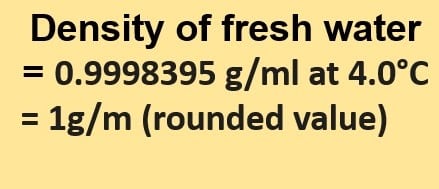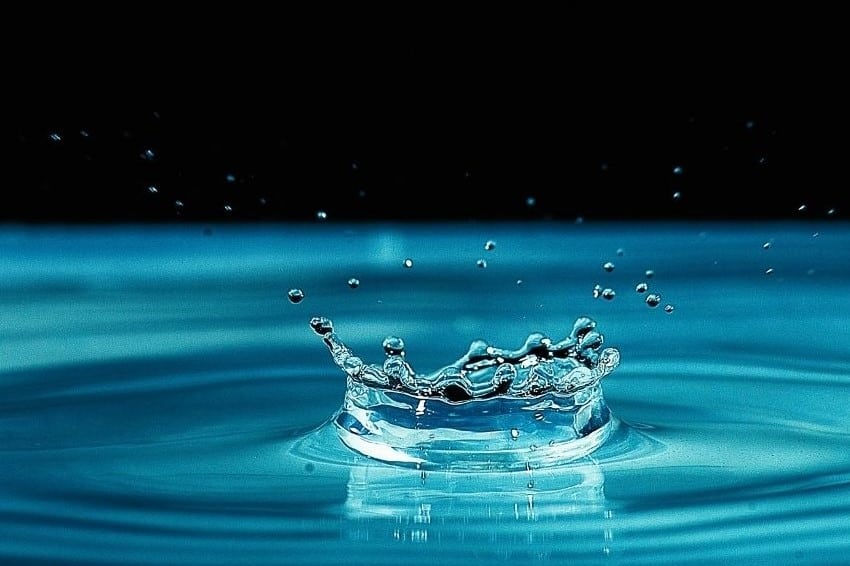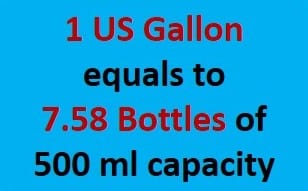Oil floats on water because the density of oil is less than water. In liquids, density is defined as how much mass of anything can be filled into a cubic meter of volume. Water has a density of around 1000 kg/cubic meter and for oils, it varies from 800 to 960 kg/cubic meter. Due to this density difference, oil floats on water.

Table of Contents
Why does oil float on water?
Oil floats on water because its density is lower than that of water.
Density is defined as mass per unit volume. That is, a cubic centimeter (cc) of oil has a substantially lower mass than a cubic centimeter (cc) of water. The buoyant force notion might also help to comprehend this.
The buoyant force is simply an upward force applied to objects immersed in fluids. When oil is submerged in water, the buoyant force equals the weight of the water displaced by the oil. In a nutshell, when oil is submerged in water, the buoyant force (upward force) is far greater than the weight of the oil, causing it to float.
Weight of Water
The weight of water depends upon temperature. At 17 °C, one US gallon of water weighs 8.345 pounds or 3.785 kg, but one Imperial gallon of water weighs 10.02 pounds or 4.545 kg.
1 US gallon (gal) weighs 16.6 percent less than 1 Imperial gallon.
The density of water g/ml
The density of water in g/ml is around 1 gram per milliliter but this changes with temperature or if there are substances dissolved in it. Ice is less dense than liquid water that’s why ice cubes float on water.
A common unit of measurement for water’s density is grams per milliliter (1 g/ml) or 1 gram per cubic centimeter (1 g/cm3). The density of water on Earth at 4°C is 1000 kg/m3.
Why does ice float on water?
Solid water (ice) is less dense than liquid water.
Every water molecule is made up of two hydrogen atoms bonded to one oxygen atom.
Water behaves abnormally when cooled, due to its molecular structure.
It continues to contract and reduce in volume until 4°C.
At 39.2ºF or 4ºC, water has a maximum density
Beyond this point, its volume increases and becomes more than the initial volume.
This results in a decrease in density, that’s why ice is lighter than liquid water.
Why do oil and water not mix?
Water and oil do not mix. This is due to the fact that water is a polar molecule, with a positive charge on one end and a negative charge on the other. Water molecules adhere to one another because the positive end of one water molecule is attracted to the negative end of another. An oil molecule, on the other hand, has a non-polar structure. Instead of having one positive and one negative end, its charge is evenly balanced.
Summary
- The answer to the question “Why does oil float on water?” is that oil floats on water because of its lower density than water.
- Oil and water molecules do not mix with each other due to the polarity of water molecules and the non-polarity of oil molecules.
- The density of the liquid is the mass of a liquid in cubic meters of volume.
- When oil is spilled in water, the buoyant force (upward force) is far greater than the weight of the oil, causing it to float.
Related Links
How Many Bottles Of Water Equal A Gallon
Specific Heat Concept
Concentration Gradient Definition
Soft Water vs. Hard Water
The Specific Gravity of Water
Exams Related Questions
| # | Exam-Related Questions | Brief Answers |
|---|---|---|
| 1 | Why does oil float on water? | Oil floats on water because it is less dense than water. |
| 2 | What is the scientific reason behind oil floating? | The scientific reason behind oil floating is its density. |
| 3 | What is the density of oil? | The density of oil is less than that of water. |
| 4 | How does the density of oil compare to water? | The density of oil is lower than the density of water. |
| 5 | What happens when oil is poured into water? | When oil is poured into water, it forms a layer on top of the water because it is less dense. |
| 6 | Can oil sink in water? | Yes, if the density of the oil is greater than the density of the water, then the oil can sink. |
| 7 | What factors affect the floating of oil on water? | The factors that affect the floating of oil on water are its density, temperature, and viscosity. |
| 8 | Why does vegetable oil float on water? | Vegetable oil floats on water for the same reason that any oil does – it is less dense than water. |
| 9 | How does the density of different types of oil compare to each other? | The density of different types of oil can vary, but most oils are less dense than water. |
Frequently Asked Questions
1. How many cups are in a gallon?
A US liquid gallon is equivalent to 16 cups, whereas a US dry gallon is equivalent to 18.61 cups. One cup is half a pint in the United States (236.6 ml). (Check the full article How Many Cups in a Gallon? Cups to Pints, Quarts, and More)
2. What is freshwater?
Freshwater is water that contains no large concentrations of salt, such as water from lakes and rivers. Freshwater has dissolved solids of less than 1,000 milligrams per liter, which are usually salt.
Freshwater accounts for only 3% of the total amount of water on earth.
In glaciers, polar ice caps, and the atmosphere, 2.5 percent of the world’s freshwater is locked up.
3. Is water vapor a greenhouse gas?
Water vapor is a major greenhouse gas because it absorbs longwave radiation and radiates it back to the surface, contributing to global warming. Furthermore, by weight and volume, it is the most abundant greenhouse gas in the atmosphere.
4. Is water a pure substance and what is portable water?
Pure water is also known as distilled water or deionized water. In distilled water, evaporation removes all of the dissolved substances. As it evaporates, water distills or leaves the salt behind. Pure water is collected and condensed to produce distilled water.
Water suitable for human consumption is defined as potable water (i.e., water that can be used for drinking or cooking). The term implies that the water is both safe and drinkable.
5. What is the viscosity of water?
The viscosity of water is 0.01 P.s (Pascal seconds) at 20 degrees Celsius.
The resistance to fluid flow and the movement of an object through a fluid is usually expressed in terms of viscosity. The Poiseuille unit of measure for viscosity is Pascal seconds (Pa s). Poise is the more commonly used dyne sec/cm2.
6. What is the specific gravity of water?
The specific gravity of water is 1 at 4 degrees Celsius because this is the standard value used by scientists to determine the specific gravity of various substances. However, a water sample was taken at a different temperature or pressure, or one that contains impurities has a slightly different specific gravity value.
7. What is the kinematic viscosity of water?
The kinematic viscosity of water at 20 °C is about 1 cSt.
The physical unit for kinematic viscosity is the stokes (St), named after George Stokes. It is sometimes expressed in terms of centistokes (cS or cSt); 1 stokes = 100 centistokes = 1 cm2 s−1 = 0.0001 m2 s−1.
More Interesting Links
- BCl3 Lewis Structure in four simple steps - November 1, 2023
- PH3 Lewis Structure in four simple steps - October 8, 2023
- PF3 Lewis structure in four simple steps - September 24, 2023



